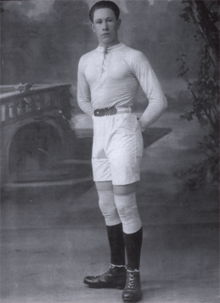Jean Galia
Jean Galia (born 20 March 1905 in Ille-sur-Têt, Pyrénées-Orientales, died 17 January 1949 in Toulouse) was a French rugby union and rugby league footballer and champion boxer. He is credited with establishing the sport of rugby league in France in 1934,[2] where it is known as rugby à treize ("rugby 13s").
 | |||||||||||||||||||||||||||||||||||||||||||
Personal information | |||||||||||||||||||||||||||||||||||||||||||
|---|---|---|---|---|---|---|---|---|---|---|---|---|---|---|---|---|---|---|---|---|---|---|---|---|---|---|---|---|---|---|---|---|---|---|---|---|---|---|---|---|---|---|---|
| Born | 20 March 1905 Ille-sur-Têt, France | ||||||||||||||||||||||||||||||||||||||||||
| Died | 17 January 1949 (aged 43) Toulouse, France | ||||||||||||||||||||||||||||||||||||||||||
Playing information | |||||||||||||||||||||||||||||||||||||||||||
Rugby union | |||||||||||||||||||||||||||||||||||||||||||
| Position | Lock, No. 8 | ||||||||||||||||||||||||||||||||||||||||||
| |||||||||||||||||||||||||||||||||||||||||||
Rugby league | |||||||||||||||||||||||||||||||||||||||||||
| Position | Second-row | ||||||||||||||||||||||||||||||||||||||||||
| |||||||||||||||||||||||||||||||||||||||||||
Source: [1] | |||||||||||||||||||||||||||||||||||||||||||
Playing in the forwards, Galia made his international debut for the France national rugby union team in a 1927 test against England in Paris. After 20 internationals, He later played in France's first ever rugby league international, also against England in Paris, on 15 April 1934 and was captain of the France national rugby league team in its early days. Following France's tour of Northern England, Galia arranged a series of demonstration matches around France.[3]
The Courtney Goodwill Trophy, international rugby league's first, was presented for the first time in 1936 and depicted Galia, along with other pioneering greats of the code, James Lomas (Britain), Albert Baskiville (New Zealand) and Dally Messenger (Australia).[4]
In 1988 Galia was inducted into the Rugby League Hall of Fame.
References
- Rugby League Project
- Collins, Tony (2009). A Social History of English Rugby Union. Taylor & Francis. p. 175. ISBN 978-0-415-47660-7. ISBN 0-415-47660-7.
- Dine, Philip (2001). French rugby football: a cultural history. Berg Publishers. p. 86. ISBN 978-1-85973-327-1. ISBN 1-85973-327-1.
- “League Legends: fast facts about rugby league” Archived 14 September 2009 at the Wayback Machine at nsm.org.au
External links
- Jean Galia at scrum.com
- Jean Galia's introduction of the May 1934 Yorkshire's tour in France : Jean Galia's parent of the expression jeu à treize or Game of thirteen
- History of rugby league at napit.co.uk
- History of Rugby football in France at independent.co.uk